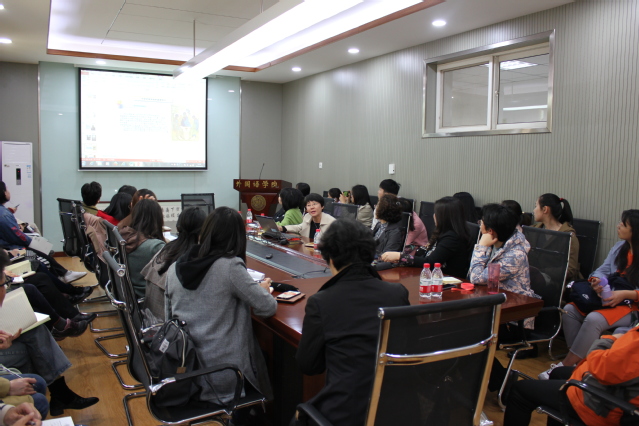
On the 12th of April, hosted by the Graduate Affairs Office of the Party Committee and organized by the the CFL, “Graduate Academic Week”was held in the CFL. Zhang Bing, researcher of the Russsian culture in the Peking University(PKU), dean of the department of the foreign languages in the Publishing House of the PKU and deputy editor of delivered a lecture on “The Brief History of Russian Art and Culture”. Wang Lidan, dean of the Russian Department of the CFL, hosted the lecture. About 40 people from undergraduates, graduates and Ph.D candidate participated in the lecture.
First of all, Pro. Zhang Bing gave a brief introduction to the Russian art and culture in terms of architecture, painting, statue, music, movie and literature. Then he presented his speech into three parts in detail: firstly, the Russian Art and culture in middle ages ( in the 10th-17th century ); The literature and art in this period were characterized by religion, independence, succession, slow development and anonymity. Secondly, contemporary Russian art and culture ( in the 18th and 19th century ); The literature and art in this period were characterized by secularization, “capitalized individual”, openness and vitality. Russia turned the table over in the culture which was inferior to that of Europe. After all, the Russian culture made great contribution to the world cultural heritage. Thirdly, the Russian art and culture in the 20th century; The avant garde art reached the highest level. Though checked by the ideology to some extent, the art and culture grew in all aspects. In the 1000 years of history, the Russian art and culture had its own characteristics and the artists and their masterpieces glittered in the world.
Pro. Zhang Bing guided the students through the outline of the Russian art, culture and history to appreciate the spectacular artistic world. Comparing with the Chinese, Byzantine and Roman art in a particular subject, disclosed the distinctive nationality and contemplated over the past and future of the Russian art and culture. Her speech was convincing to the students because of the vivid pictures, her humorous language and the rigorous scholarship. After the speech, she answered some questions with patience and amity.



